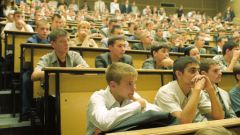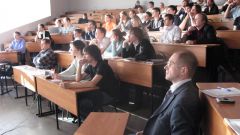As for full-time and part-time students the academic year is divided into 2 parts (2 semesters), after which the student takes exams and tests in the studied subjects. Usually this happens in winter and summer (winter and summer session). With any form of exams and credits are passed personally to the teacher, but the learning process of year full-time post" and "time" are very different.
Full-time education suggests the need for immediate personal presence of the student in lectures, seminars and practical classes, personal involvement in other activities in the curriculum of the University, College or technical school. As a rule, classes are held on schedule, and to ignore them is not recommended.
Sometimes during the semester program can be provided an intermediate examination paper or other types of accounting students. It helps to optimize the learning process, promotes the systematic acquisition of knowledge. In fact, the organization of educational process, schedule of classes, the volume of learning material reglamentary school, and the student remains only to measure the forces and abilities to adapt to the proposed system.
Of course, the full-time education helps the best way to acquire knowledge. This largely contributes to the direct communication of the student with the teaching staff, which may go beyond the training sessions.
As a rule, this form of training choose school leavers and those young people who can afford not to work, and all his time to devote to learning. Of course, you can combine work and training, but full-time priority will still belong to the school.
In absentia and the student independently organizes their learning and actually doing self-study. The role of schools is reduced to a kind of orientation of the student. In accordance with the curriculum he proposed certain subjects for study, are indicative of the extent to which these disciplines must be learned, and recommended sources, which can be used in the process of self-education.
Further training, its organization, and largely content to remain under the jurisdiction of the student. He chooses the time to practice, which determines the volume of the educational material he needs to learn in order to successfully pass the session.
Exams and tests, as in full-time education, part-time allow you to control the level of student knowledge on a particular subject. The role of interim credits in absentia can play the written work (essays, coursework and examinations) that the student is required to forward to the faculty during the semester or pass directly before the next session.
It is believed that teaching by correspondence is not as robust and complete as in full-time education. But with a high level of self-discipline, serious approach to learning part-time students according to their level of knowledge can come close to the listener head office.
Distance learning is chosen by those who need to continue working without interruption to study. This allows, without prejudice to their financial situation and professional status to obtain additional knowledge and a diploma of education.
Full-time study
Full-time education suggests the need for immediate personal presence of the student in lectures, seminars and practical classes, personal involvement in other activities in the curriculum of the University, College or technical school. As a rule, classes are held on schedule, and to ignore them is not recommended.
Sometimes during the semester program can be provided an intermediate examination paper or other types of accounting students. It helps to optimize the learning process, promotes the systematic acquisition of knowledge. In fact, the organization of educational process, schedule of classes, the volume of learning material reglamentary school, and the student remains only to measure the forces and abilities to adapt to the proposed system.
Of course, the full-time education helps the best way to acquire knowledge. This largely contributes to the direct communication of the student with the teaching staff, which may go beyond the training sessions.
As a rule, this form of training choose school leavers and those young people who can afford not to work, and all his time to devote to learning. Of course, you can combine work and training, but full-time priority will still belong to the school.
Correspondence
In absentia and the student independently organizes their learning and actually doing self-study. The role of schools is reduced to a kind of orientation of the student. In accordance with the curriculum he proposed certain subjects for study, are indicative of the extent to which these disciplines must be learned, and recommended sources, which can be used in the process of self-education.
Further training, its organization, and largely content to remain under the jurisdiction of the student. He chooses the time to practice, which determines the volume of the educational material he needs to learn in order to successfully pass the session.
Exams and tests, as in full-time education, part-time allow you to control the level of student knowledge on a particular subject. The role of interim credits in absentia can play the written work (essays, coursework and examinations) that the student is required to forward to the faculty during the semester or pass directly before the next session.
It is believed that teaching by correspondence is not as robust and complete as in full-time education. But with a high level of self-discipline, serious approach to learning part-time students according to their level of knowledge can come close to the listener head office.
Distance learning is chosen by those who need to continue working without interruption to study. This allows, without prejudice to their financial situation and professional status to obtain additional knowledge and a diploma of education.




